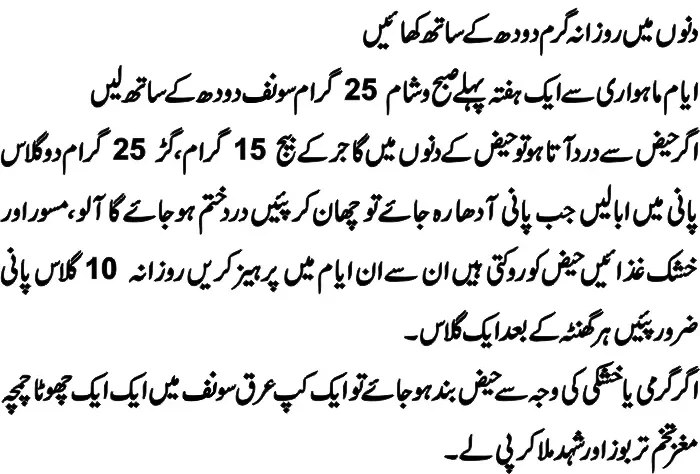
Irregular periods, or periods that don’t follow the usual 28-day cycle, can be confusing and worrying for many women. These menstrual cycle variations, known as oligomenorrhea, happen for different reasons, including hormonal imbalances, stress, and medical issues. Irregular periods can disrupt the normal reproductive system rhythm and may affect fertility and overall health.
This article aims to simplify the understanding of irregular periods, exploring the various factors causing them and their impact on physical and emotional well-being. By gaining insight into this topic, women can better manage their reproductive health.
Irregular Periods Treatment Naturally

How to Regulate Menstrual Cycle with Home Remedies (Urdu)


Causes of Irregular Periods:
Hormonal Imbalances:
Hormones play a pivotal role in regulating the menstrual cycle. Any imbalance in hormones, such as estrogen and progesterone, can lead to irregular periods. Stress, weight fluctuations, and certain medical conditions can disrupt hormonal harmony.
Polycystic Ovary Syndrome (PCOS):
PCOS is a common condition where small cysts form on the ovaries, disrupting the normal ovulation process. This can result in irregular periods and other symptoms like acne and weight gain.
Thyroid Disorders:
The thyroid gland plays a crucial role in regulating metabolism and hormonal balance. Both hypothyroidism and hyperthyroidism can impact the menstrual cycle, causing irregularities.
Excessive Exercise:
While regular physical activity is essential for overall health, excessive exercise can lead to irregular periods. Intense workouts may affect hormone production, causing disruptions in the menstrual cycle.
Poor Nutrition:
A balanced diet is vital for maintaining a healthy reproductive system. Nutrient deficiencies, particularly in iron and vitamin B, can contribute to irregular periods.
Strategies for Regulating Menstrual Cycles:
Maintain a Healthy Lifestyle:
Adopting a healthy lifestyle is crucial for regulating menstrual cycles. Ensure a balanced diet rich in fruits, vegetables, and whole grains. Regular exercise in moderation can also contribute to hormonal balance.
Manage Stress:
Stress is a significant factor influencing hormonal fluctuations. Practice stress-reducing activities such as yoga, meditation, or deep breathing exercises to promote overall well-being and regulate your menstrual cycle.
Stay Hydrated:
Hydration is often overlooked but plays a crucial role in maintaining hormonal balance. Drinking an adequate amount of water helps support overall bodily functions, including the menstrual cycle.
Maintain a Healthy Weight:
Both underweight and overweight conditions can contribute to irregular periods. Strive for a healthy weight range through a balanced diet and regular exercise.
Consider Birth Control:
In some cases, hormonal birth control methods can help regulate menstrual cycles. Consult with a healthcare professional to explore suitable options based on your individual health needs.
Address Thyroid Issues:
If thyroid disorders contribute to irregular periods, seeking medical attention is crucial. Proper diagnosis and treatment can help restore thyroid function and normalize the menstrual cycle.
Consult a Healthcare Professional:
If irregular periods persist or are accompanied by severe symptoms, it’s essential to consult a healthcare professional. They can conduct necessary tests to identify the underlying cause and recommend appropriate treatment.
FAQs
Q: Can birth control cause irregular periods?
A: Yes, sometimes birth control can make periods irregular. Some types may initially cause changes, so talk to your doctor about what’s best for you.
Q: Is it normal to have irregular periods during perimenopause?
A: Yes, it’s common. Before menopause, periods might become irregular due to changing hormones. If worried, check with your doctor.
Q: Can stress affect periods, even if not all the time?
A: Yes, stress, even short-term, can mess with periods. Try relaxation methods like deep breathing to help keep periods regular.
Q: Do irregular periods happen after stopping birth control?
A: Yes, it’s normal. After quitting birth control, your body needs time to adjust. If concerns linger, ask your doctor for advice.
Q: Can food affect periods?
A: Yes, what you eat matters. A balanced diet with vitamins is crucial. Also, stay hydrated and avoid too much caffeine or sugary foods for regular periods.
Q: Can smoking affect menstrual cycles?
A: Yes, smoking can impact menstrual cycles. It may lead to hormonal imbalances, affecting the regularity of periods. Quitting smoking can contribute to overall reproductive health.
Q: Is it normal to experience changes in periods during adolescence?
A: Yes, it’s common for periods to be irregular during adolescence as the body undergoes hormonal changes. With time, menstrual cycles often become more regular.
Q: Can certain medications cause irregular periods?
A: Yes, some medications may affect menstrual cycles.
Q: How does body weight impact menstrual regularity?
A: Body weight plays a role in menstrual regularity. Both being underweight and overweight can lead to irregular periods. Maintaining a healthy weight through balanced nutrition is important for overall well-being.
Q: Can herbal supplements help regulate menstrual cycles?
A: Some women find relief with herbal supplements, like chasteberry or ginger, to regulate menstrual cycles.
Irregular periods can be a challenging aspect of a woman’s life, but with a proactive approach and lifestyle adjustments, they can be effectively managed. Understanding the causes, adopting a healthy lifestyle, and seeking professional guidance when needed are key steps toward regulating your menstrual cycle. By prioritizing your overall well-being, you can empower yourself to navigate the journey of womanhood with confidence and ease.







